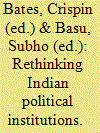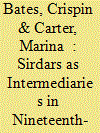| Srl | Item |
| 1 |
ID:
066438


|
|
|
|
|
| Publication |
London, Anthem Press, 2005.
|
| Description |
xxvi, 262p.
|
| Series |
Anthem South Asian studies
|
| Contents |
Crispin Bates is the Series Editor
|
| Standard Number |
1843310805
|
|
|
|
|
|
|
|
|
|
|
|
Copies: C:1/I:0,R:0,Q:0
Circulation
| Accession# | Call# | Current Location | Status | Policy | Location |
| 050281 | 327.54/BAT 050281 | Main | On Shelf | General | |
|
|
|
|
| 2 |
ID:
152623


|
|
|
|
|
| Summary/Abstract |
The sirdar (also termed sardar and jobber in Indian historiography)—foreman, recruiter, at once a labour leader and an important intermediary figure for the employers of labour both in India and in the sugar colonies—is reassessed in this article. Tithankar Roy's thoughtful 2007 article looked at how the sirdars’ multiple roles represent an incorporation of traditional authority in a modern setting, giving rise to certain contradictions. In 2010 Samita Sen, conversely, developed Rajnarayan Chandavarkar's argument about the use of labour intermediaries in colonial India to reveal how, in the case of the Assam tea plantations, the nexus between contractors and sirdars belies the ‘benign’ role often accorded to the intermediary within narratives from the tea industry. This article provides examples from the overseas labour destinations in the Indian Ocean region, particularly Mauritius, to further develop and nuance the debate, through an assessment of the complexity of sirdari roles in the colonial Indian labour diaspora.
|
|
|
|
|
|
|
|
|
|
|
|
|
|
|
|